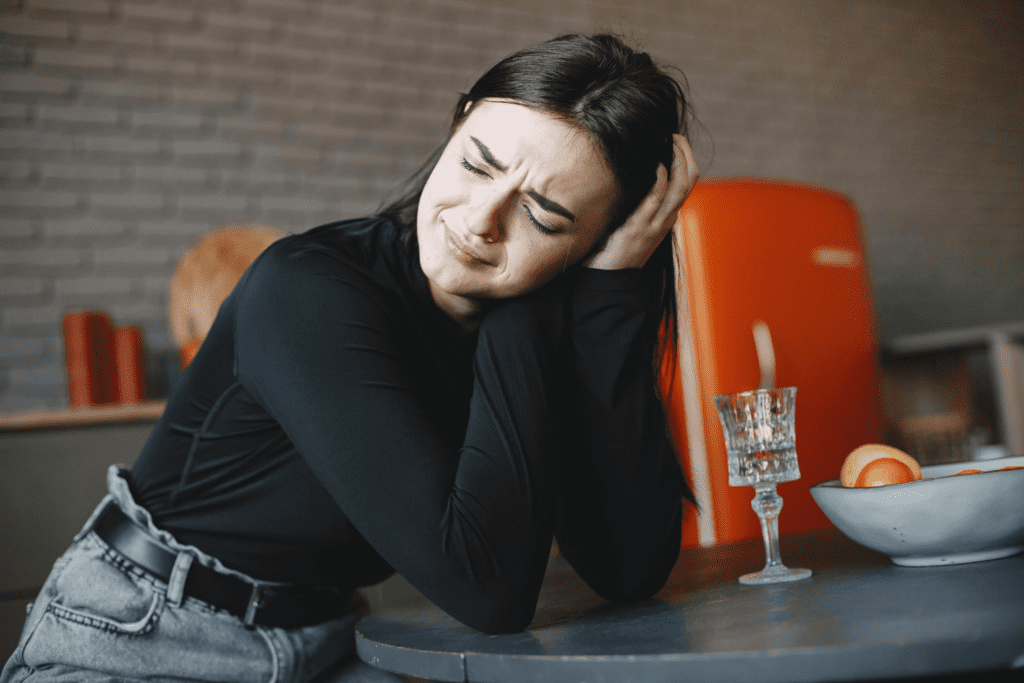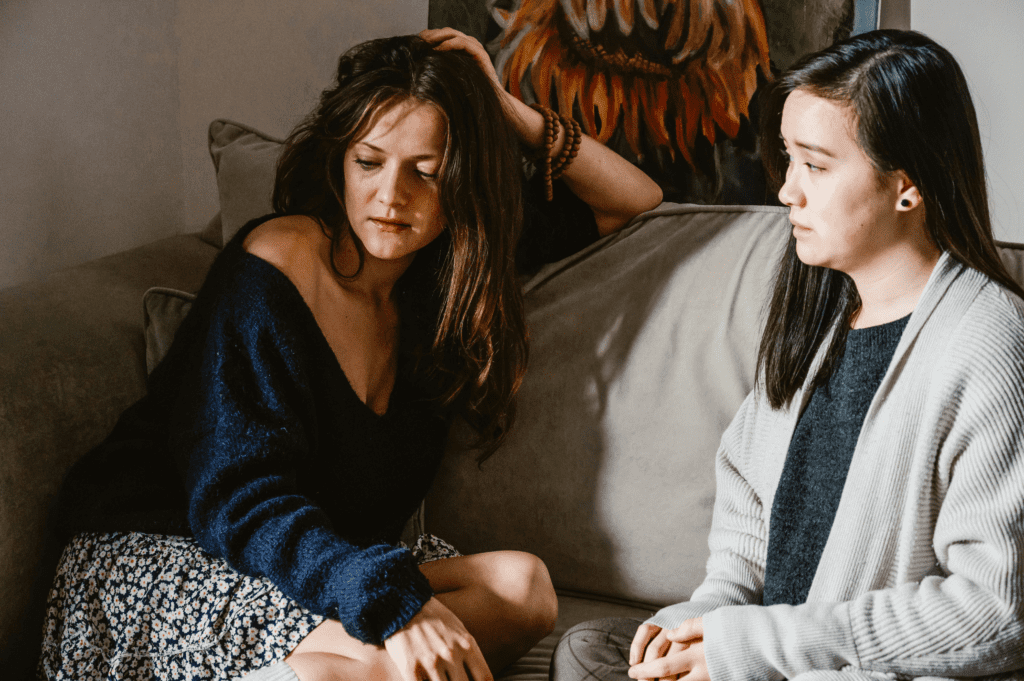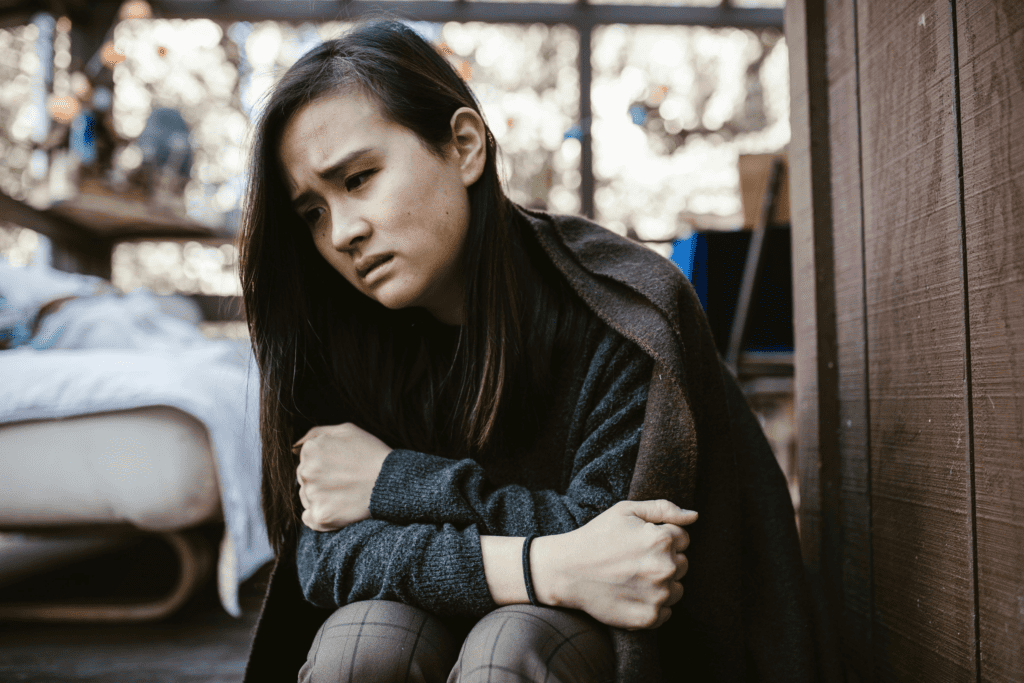Last updated on December 18th, 2024 at 03:09 am
- 2. The Evolution of Anxiety Treatment
- 2.1 The Benzodiazepine Revolution
- 2.2 The Rise of Antidepressants
- 2.3 Current Approaches
- 3. Major Classes of Anti-Anxiety Medications
- 3.1 Selective Serotonin Reuptake Inhibitors (SSRIs)
- 3.2 Serotonin-Norepinephrine Reuptake Inhibitors (SNRIs)
- 3.3 Benzodiazepines
- 3.4 Buspirone
- 3.5 Beta-Blockers
- 4. Mechanism of Action
- 4.1 Neurotransmitter Modulation
- 4.2 GABA Enhancement
- 4.3 Receptor Targeting
- 4.4 Peripheral Effects
- 5. Efficacy and Limitations
- 5.1 Factors Affecting Efficacy
- 5.2 Limitations and Challenges
- 6. Side Effects and Risks
- 6.1 Common Side Effects
- 6.2 Serious Risks
- 7. Special Populations and Considerations
- 7.1 Pregnancy and Breastfeeding
- 7.2 Children and Adolescents
- 7.3 Older Adults
- 8. Future Directions in Anxiety Treatment
- 8.1 New Pharmacological Targets
- 8.2 Personalized Medicine
- 8.3 Psychedelic-Assisted Therapy
- 8.4 Digital Therapeutics
- Exploring Non-Pharmacological Therapies
- Tricyclic Antidepressants: An Alternative Approach
- Addressing Sexual Dysfunction Symptoms
- SSRIs and SNRIs: Managing Anxiety and Associated Conditions
- Managing Symptoms of Serotonin Syndrome
- Blurred Vision and Other Adverse Effects
- Treatment of Depression in Comorbid Anxiety
- Clinical Trials and Their Role in Anxiety Management
- Addressing Neuropathic Pain and Related Conditions
- Suicidal Ideation and Special Considerations
- Natural Remedies and Non-Pharmacological Treatments
- Support Systems and Lifestyle Changes
- Telemedicine for Anxiety Treatment
- Addressing Anxiety in Children and Adolescents
- Understanding Anxiety Triggers and Coping Mechanisms
- Exploring New Therapeutic Approaches
- Bipolar Disorder and Anxiety Treatment
- Dysphoric Disorder and Anxiety
- Evaluating Classes of Antidepressants
- Comparing Classes of Antidepressant
- Specific Classes of Antidepressants
- Non-Pharmacological Options for Severe Anxiety
- Acupuncture and Massage Therapy
- Art Therapy and Music Therapy
- External Service Utilization
- Addressing Individual Needs in Anxiety Management
- Experimental Studies and Health Technology Assessment
- Managing Neuropsychiatric Symptoms
- Speed and Quality of Therapeutic Response
- Lifestyle Changes and Coping Strategies
- Stress Management Techniques
- Support Groups and Peer Support
- Sleep Hygiene Tips and Pet Therapy
- Non-Pharmacological Therapies in Specific Populations
- Workplace Accommodations for Anxiety Disorders
- Recognizing Anxiety in Children
- Conclusion
- Frequently Asked Questions
- What Are The Best Anti-Anxiety Medications For Generalized Anxiety Disorder?
- How Do Benzodiazepines Help With Anxiety Relief?
- What Are The Common Side Effects Of Anti-Anxiety Drugs?
- How Do SSRIs And SNRIs Differ In Treating Anxiety Disorders?
- Can Tricyclic Antidepressants Be Used For Anxiety Treatment?
- What Is Serotonin Syndrome And How Is It Related To Anti-Anxiety Medications?
- How Long Does It Take For Anti-Anxiety Medications To Show Therapeutic Response?
- Are There Non-Addictive Anti-Anxiety Medications Available?
- What Are The Sexual Side Effects Associated With Anti-Anxiety Medications?
- How Are Tricyclic Antidepressants Different From SSRIs For Anxiety?
- What Types Of Anxiety Are Benzodiazepines Most Effective For?
- How Can Cognitive Behavioral Therapy (CBT) Be Combined With Medications For Anxiety?
- What Is The Risk Of Benzodiazepine Withdrawal Symptoms?
- Are There Natural Alternatives To Benzodiazepines For Anxiety Relief?
- How Do SNRIs Work For Generalized Anxiety Disorder?
- Can Anti-Anxiety Medications Cause Respiratory Depression?
- What Role Do Healthcare Providers Play In Managing Anti-Anxiety Medications?
- How Are Anti-Anxiety Medications Used For Treatment-Resistant Depression?
- What Are The Symptoms Of Serotonin Syndrome Related To Anti-Anxiety Medications?
- What Are The Advantages Of Using SSRIs Over Benzodiazepines For Long-Term Anxiety Management?
- Can Tricyclic Antidepressants Be Combined With Other Medications For Anxiety Relief?
Anxiety is a complex emotional and physiological response that serves an important evolutionary purpose. When faced with potential threats or stressors, our bodies activate the “fight-or-flight” response, releasing hormones like adrenaline and cortisol to heighten alertness and prepare for action. In moderation, this can be adaptive – helping us focus before an important presentation or stay vigilant in potentially dangerous situations.
However, for millions of people, anxiety becomes chronic and debilitating, interfering with daily life and wellbeing. Anxiety disorders are among the most common mental health conditions, affecting an estimated 40 million adults in the United States alone. These disorders can manifest in various ways, from generalized anxiety and social phobias to panic attacks and obsessive-compulsive behaviors.
While therapy and lifestyle changes are often the first line of treatment, medications can play an important role in managing severe or treatment-resistant anxiety. Anti-anxiety medications work by modulating neurotransmitters and brain activity to reduce excessive worry, fear, and physical symptoms. However, these drugs are not a one-size-fits-all solution and come with potential risks and side effects that must be carefully weighed.
2. The Evolution of Anxiety Treatment
The understanding and treatment of anxiety has evolved significantly over the past century. Early attempts to medicate anxiety often relied on dangerous and addictive substances like opioids, alcohol, and barbiturates. While these could provide temporary relief, they carried serious risks of dependence and overdose.
2.1 The Benzodiazepine Revolution
The development of benzodiazepines in the 1950s marked a major turning point. Drugs like Valium and Xanax offered rapid anxiety relief with less risk of fatal overdose compared to barbiturates. However, concerns about dependence and cognitive side effects have led to more cautious prescribing in recent decades.
2.2 The Rise of Antidepressants
The 1980s and 90s saw increasing use of antidepressants, particularly selective serotonin reuptake inhibitors (SSRIs), for anxiety disorders. While slower-acting than benzodiazepines, SSRIs and related drugs offered long-term anxiety management with lower abuse potential.
2.3 Current Approaches
Today, anxiety treatment typically involves a combination of psychotherapy (especially cognitive-behavioral approaches), lifestyle modifications, and judicious use of medications. There’s growing interest in non-drug options like mindfulness training, as well as novel pharmacological targets beyond the traditional serotonin and GABA systems.


3. Major Classes of Anti-Anxiety Medications
3.1 Selective Serotonin Reuptake Inhibitors (SSRIs)
SSRIs like fluoxetine (Prozac), sertraline (Zoloft), and escitalopram (Lexapro) are often the first-line medication treatment for anxiety disorders. They work by increasing levels of serotonin in the brain, which is thought to play a key role in mood regulation and anxiety. SSRIs typically take several weeks to reach full effect but can provide long-term anxiety relief with generally manageable side effects.
3.2 Serotonin-Norepinephrine Reuptake Inhibitors (SNRIs)
SNRIs such as venlafaxine (Effexor) and duloxetine (Cymbalta) affect both serotonin and norepinephrine, another neurotransmitter involved in mood and arousal. They may be particularly helpful for anxiety accompanied by physical symptoms or pain.
3.3 Benzodiazepines
Benzodiazepines like alprazolam (Xanax), lorazepam (Ativan), and clonazepam (Klonopin) provide rapid relief of acute anxiety symptoms. They enhance the effect of GABA, the brain’s primary inhibitory neurotransmitter. While effective, concerns about tolerance, dependence, and cognitive impairment limit their long-term use.
3.4 Buspirone
Buspirone (BuSpar) is a non-benzodiazepine anxiolytic that acts on serotonin receptors. It’s less sedating than benzodiazepines and doesn’t carry the same risk of dependence, making it a safer option for long-term use in some patients.
3.5 Beta-Blockers
While primarily used for cardiovascular conditions, beta-blockers like propranolol can help manage the physical symptoms of anxiety (e.g., rapid heartbeat, tremors) in specific situations like performance anxiety.
4. Mechanism of Action
Anti-anxiety medications work through various mechanisms to modulate neurotransmitter systems and brain activity:
4.1 Neurotransmitter Modulation
SSRIs and SNRIs increase the availability of serotonin and/or norepinephrine in the synaptic cleft by blocking their reuptake. This leads to enhanced signaling of these mood-regulating neurotransmitters.
4.2 GABA Enhancement
Benzodiazepines bind to GABA-A receptors, potentiating the inhibitory effects of GABA. This results in decreased neuronal excitability and a calming effect on the central nervous system.
4.3 Receptor Targeting
Buspirone acts as a partial agonist at certain serotonin receptors, modulating serotonergic transmission without the broad effects of SSRIs.


4.4 Peripheral Effects
Beta-blockers block the effects of adrenaline and noradrenaline on the cardiovascular system, reducing physical symptoms of anxiety without directly affecting brain chemistry.
5. Efficacy and Limitations
While anti-anxiety medications can be highly effective for many patients, their efficacy varies widely between individuals and specific anxiety disorders. Response rates in clinical trials typically range from 40-60% for SSRIs/SNRIs in generalized anxiety disorder, with somewhat lower rates for social anxiety and panic disorders.
It’s important to note that medications alone are rarely sufficient for optimal anxiety management. Combining pharmacotherapy with psychotherapy (especially cognitive-behavioral approaches) often yields better outcomes than either treatment alone.
5.1 Factors Affecting Efficacy
Several factors can influence medication response:
– Genetic variations in neurotransmitter systems and drug metabolism
– Severity and duration of anxiety symptoms
– Presence of comorbid conditions (e.g., depression, substance use disorders)
– Adherence to medication regimens
– Lifestyle factors (diet, exercise, stress management)
5.2 Limitations and Challenges
Anti-anxiety medications face several limitations:
– Delayed onset of action for many drugs (especially SSRIs/SNRIs)
– Potential for side effects and adverse reactions
– Risk of dependence and withdrawal (particularly with benzodiazepines)
– Incomplete symptom relief in some patients
– Potential for loss of efficacy over time
6. Side Effects and Risks
All anti-anxiety medications carry potential risks and side effects that must be carefully considered:
6.1 Common Side Effects
– SSRIs/SNRIs: Nausea, sexual dysfunction, insomnia, headache
– Benzodiazepines: Sedation, dizziness, cognitive impairment
– Buspirone: Dizziness, nausea, headache
– Beta-blockers: Fatigue, cold extremities, bradycardia
6.2 Serious Risks
– Increased suicidal thoughts (particularly in young adults starting SSRIs)
– Serotonin syndrome (with SSRIs/SNRIs, especially when combined with other serotonergic drugs)
– Withdrawal symptoms (especially with benzodiazepines)
– Potential for abuse and dependence (primarily with benzodiazepines)
– Cognitive impairment and increased fall risk in older adults
7. Special Populations and Considerations
7.1 Pregnancy and Breastfeeding
The use of anti-anxiety medications during pregnancy and lactation requires careful risk-benefit analysis. While some SSRIs are considered relatively safe, benzodiazepines may increase the risk of certain birth defects. Close monitoring and collaboration between mental health providers and obstetricians is essential.


7.2 Children and Adolescents
Anxiety disorders often emerge in childhood or adolescence. While SSRIs are sometimes prescribed for pediatric anxiety, careful monitoring is crucial due to potential increased risk of suicidal thoughts in young people.
7.3 Older Adults
Older adults may be more sensitive to medication side effects and at higher risk for drug interactions due to polypharmacy. Benzodiazepines, in particular, should be used cautiously due to increased risk of falls and cognitive impairment.
8. Future Directions in Anxiety Treatment
Research into novel anxiety treatments continues to evolve:
8.1 New Pharmacological Targets
Researchers are exploring drugs that target other neurotransmitter systems, including glutamate modulators and neuropeptide receptor antagonists.
8.2 Personalized Medicine
Advances in genetic testing and biomarker research may eventually allow for more tailored medication selection based on individual patient characteristics.
8.3 Psychedelic-Assisted Therapy
There’s growing interest in the potential of psychedelic compounds like psilocybin and MDMA, used in controlled therapeutic settings, for treating anxiety disorders resistant to conventional treatments.
8.4 Digital Therapeutics
Smartphone apps and virtual reality-based exposure therapy offer new avenues for anxiety management, potentially reducing reliance on medications for some patients.
Exploring Non-Pharmacological Therapies
While anti-anxiety medications are highly effective for many, non-pharmacological therapies can serve as complementary approaches. Psychological therapies, such as cognitive behavioral therapy for anxiety, often help individuals gain coping skills and modify thought patterns.
In particular, cognitive-behavioral approaches can provide substantial benefits to those experiencing generalized anxiety disorder. Techniques such as exposure therapy and relaxation exercises are often incorporated to reduce symptoms.


Tricyclic Antidepressants: An Alternative Approach
Tricyclic antidepressants for anxiety, such as amitriptyline and imipramine, have been found to be effective, particularly for patients with an unsatisfactory response to other medications. Though their use is less common compared to SSRIs or SNRIs, these medications are a viable option for treatment-resistant cases.
They also help alleviate chronic pain and are used as analgesic medications. Tricyclic antidepressants can be an effective choice for those suffering from both anxiety and depressive disorder or symptoms of depression.
Addressing Sexual Dysfunction Symptoms
Sexual dysfunction is a frequent concern among patients undergoing treatment with SSRIs or other types of antidepressants. This includes decreased libido, erectile dysfunction, and delayed orgasm, which impact the patient’s quality of life.
Sexual side effects may lead to reduced adherence, and healthcare providers often consider switching to a different class of antidepressant if the issue persists. Buspirone and other non-addictive anxiety medications have fewer direct effects on sexual function compared to SSRIs.
SSRIs and SNRIs: Managing Anxiety and Associated Conditions
SSRIs for anxiety treatment and SNRIs for anxiety disorders are often prescribed as first-line therapy for generalized anxiety disorder and related conditions. Both classes increase serotonin levels by blocking the reuptake of serotonin, which can alleviate symptoms over weeks of treatment.
Notably, SNRIs also influence norepinephrine, which may provide additional benefits for patients experiencing depressive disorder and anxiety. Comparing SSRIs and SNRIs for anxiety often depends on individual patient response, adverse effects, and associated medical conditions like diabetic neuropathy.
Managing Symptoms of Serotonin Syndrome
Serotonin syndrome is a rare but severe condition that may occur when serotonin levels become excessively high, particularly with combined medications affecting serotonin pathways. Symptoms of serotonin syndrome include restlessness, confusion, elevated heart rate, and in severe cases, seizures.
It is crucial for healthcare professionals to be aware of emergent symptoms and immediately address these adverse effects to prevent escalation. Patients on medications that affect serotonin must be monitored closely to prevent dangerous interactions.
Blurred Vision and Other Adverse Effects
Anti-anxiety and antidepressant medications come with various adverse effects, including blurred vision, gastrointestinal disturbances, and sexual side effects. Benzodiazepines for anxiety relief, while effective in reducing acute anxiety, can also lead to respiratory depression and tolerance.
For this reason, healthcare providers often limit their long-term use, exploring other treatment options like SSRIs or non-pharmacological therapies. Balancing efficacy with safety is crucial in determining the best anti-anxiety medication for a particular patient.


Treatment of Depression in Comorbid Anxiety
Many patients with generalized anxiety disorder also experience symptoms of depression. Treatment of depression in these patients often involves SSRIs or other antidepressant medications.
Specifically, healthcare providers might recommend a type of antidepressant based on individual symptoms. For those who have an unsatisfactory response to SSRIs, other classes of antidepressant may be considered, including tricyclic antidepressants.
Clinical Trials and Their Role in Anxiety Management
The efficacy of anxiety medications and non-pharmacological interventions is often verified through clinical trials. These trials assess the primary outcomes, standard deviation, standard error, and overall clinical response.
Notably, experimental studies are conducted to minimize detection bias and performance bias to ensure reliable outcomes. Eligible studies help determine the best anti-anxiety medications, assessing the therapeutic response rate and speed of response to treatments.
Addressing Neuropathic Pain and Related Conditions
SNRIs and certain tricyclic antidepressants are also utilized for the management of neuropathic pain, including diabetic neuropathy. These medications have shown positive effects in reducing pain baseline and addressing vasomotor symptoms.
Additionally, they are commonly prescribed for comorbid conditions such as chronic pain and depressive disorder, often providing dual benefits. Addressing both pain and anxiety improves overall quality of life for many patients.
Suicidal Ideation and Special Considerations
For individuals suffering from severe depression or treatment-resistant depression, there is an increased risk of suicidal ideation. Health care providers must carefully monitor patients during the initial weeks of treatment, especially when administering SSRIs or SNRIs.
Careful outcome assessment is necessary to detect emergent symptoms early, helping mitigate potential risks associated with these medications. Close collaboration between patient and provider is crucial during this vulnerable period.
Natural Remedies and Non-Pharmacological Treatments
Natural alternatives to benzodiazepines include herbal supplements for anxiety relief and other non-pharmacological therapies like mindfulness practices for anxiety control. Meditation techniques for anxiety management and yoga poses for anxiety relief are also effective strategies.
In cases where medications are not well-tolerated or pose a risk of adverse effects, natural remedies for anxiety are gaining popularity as adjunctive treatments. These options offer patients additional tools to manage their anxiety symptoms holistically.


Support Systems and Lifestyle Changes
Building resilience against anxiety involves lifestyle changes to reduce anxiety, such as dietary adjustments for anxiety reduction and exercise routines to alleviate anxiety. Developing a support system for anxiety, either through family, peer support, or online therapy options for anxiety, can also provide significant emotional assistance.
Additionally, Cleveland Clinic offers guidelines and resources for managing anxiety through combined pharmacological and non-pharmacological strategies. Maintaining social connections and seeking professional support are important parts of managing anxiety.
Telemedicine for Anxiety Treatment
Telemedicine for anxiety treatment has made accessing healthcare more convenient for patients who may otherwise struggle to attend in-person sessions. Platforms like Amwell and Teladoc enable individuals to consult with healthcare professionals and discuss their anxiety management strategies.
Telehealth options provide flexibility for patients needing non-addictive anxiety medications or individualized treatment plans. This convenience allows for timely adjustments to treatment based on patient needs.
Addressing Anxiety in Children and Adolescents
Recognizing signs of anxiety in children is crucial for early intervention. Pediatric anxiety is often addressed using psychological therapies, sometimes combined with SSRI treatment under strict monitoring.
The American Academy of Child and Adolescent Psychiatry provides detailed resources for parents to help a loved one with anxiety, focusing on education, therapy, and cautious use of medications. Early detection and treatment can make a substantial difference in a child’s mental health.
Understanding Anxiety Triggers and Coping Mechanisms
Understanding anxiety triggers can significantly reduce the frequency and intensity of anxiety attacks. Identifying specific triggers, such as stress, certain social situations, or physical environments, allows individuals to develop personalized coping mechanisms for anxiety attacks.
Methods such as guided imagery for anxiety reduction or deep breathing exercises for anxiety can be highly effective tools to navigate these experiences. Coping strategies vary among individuals, so personalizing techniques is key to effectiveness.
Exploring New Therapeutic Approaches
Bipolar Disorder and Anxiety Treatment
Individuals with bipolar disorder often experience episodes of anxiety alongside mood changes. Treatment requires a careful balance of medications that address both anxiety and mood stabilization.
Health care providers may prescribe a combination of antidepressant medications and mood stabilizers to help manage these overlapping symptoms. Maintaining stability is crucial for improving long-term outcomes.
Dysphoric Disorder and Anxiety
Dysphoric disorder, characterized by extreme mood disturbances, often overlaps with anxiety symptoms. Therapeutic approaches include both pharmacological interventions and psychological therapies to target neuropsychiatric symptoms comprehensively.
Addressing individual symptoms requires a personalized plan, often involving multiple types of antidepressants. Healthcare professionals ensure that treatment aligns with the specific needs of each patient.


Evaluating Classes of Antidepressants
Comparing Classes of Antidepressant
Various classes of antidepressant medications are used to manage anxiety symptoms. Tricyclic antidepressants vs. SSRIs for anxiety is a common comparison, with the former typically used for treatment-resistant anxiety.
Classes like SSRIs, SNRIs, and tricyclic antidepressants each offer unique mechanisms of action to suit different medical conditions. This diversity allows healthcare professionals to match medications to patients effectively.
Specific Classes of Antidepressants
Different classes of antidepressants cater to varying severity levels and types of anxiety. For instance, tricyclic antidepressants can help those experiencing severe depression or chronic pain, whereas SSRIs are commonly prescribed for generalized anxiety disorder.
This tailored approach allows healthcare providers to find the best solution for an individual’s needs. Adjusting the treatment plan based on patient response can enhance overall effectiveness.
Non-Pharmacological Options for Severe Anxiety
Acupuncture and Massage Therapy
Acupuncture for anxiety treatment is gaining popularity as a complementary therapy to alleviate anxiety without medication. Massage therapy for anxiety reduction is also beneficial, promoting relaxation and reducing symptoms such as muscle tension and stress.
These non-pharmacological approaches provide additional tools for patients who may want to avoid medications. They are often incorporated alongside traditional medical treatments.
Art Therapy and Music Therapy
Creative therapies like art therapy for anxiety management provide an outlet for expression, helping patients channel anxious energy into constructive activities. Similarly, music therapy for anxiety reduction can create a calming environment, significantly alleviating psychological symptoms.
Incorporating these therapies can help patients better understand and cope with their anxiety. The creative process can serve as a vital outlet for emotional release.
External Service Utilization
Patients with severe anxiety often require external service utilization for comprehensive care. Collaborating with healthcare professionals, social workers, and therapists helps ensure that all aspects of their condition, from physical to psychological symptoms, are effectively managed.
This multi-faceted approach allows for a more robust support system, ultimately benefiting patient outcomes. Access to various services can be a key determinant in the management of severe anxiety.
Addressing Individual Needs in Anxiety Management
Experimental Studies and Health Technology Assessment
Experimental studies have been vital in developing new treatments for anxiety disorders. Conducting a Health Technology Assessment allows researchers to evaluate the effectiveness of existing and novel treatments, providing essential data for refining anxiety management approaches.
These assessments provide a deeper understanding of treatment benefits and limitations. The data can inform healthcare providers in selecting the most appropriate interventions.


Managing Neuropsychiatric Symptoms
Neuropsychiatric symptoms, including insomnia, panic, and obsessive-compulsive behaviors, are common in anxiety disorders. Healthcare professionals are tasked with addressing these symptoms individually, often employing a mix of medication and non-pharmacological therapies to achieve a complete response.
Addressing each symptom specifically helps in improving overall patient outcomes. Personalized plans are essential to tackle the complexity of neuropsychiatric issues.
Speed and Quality of Therapeutic Response
Speed of response to treatment is a critical factor in determining the best medication for generalized anxiety disorder. For many, a rapid initial response can be a marker of longer-term success, while for others, it may take weeks of treatment to achieve a therapeutic response.
Tracking the standard error and standard deviation in outcome assessments helps determine treatment efficacy. Continuous monitoring ensures that adjustments are made promptly.
Lifestyle Changes and Coping Strategies
Stress Management Techniques
Stress management techniques for anxiety are crucial in mitigating its impact on daily life. Simple strategies like time management strategies to reduce anxiety, progressive muscle relaxation for anxiety, and dietary adjustments for anxiety reduction can help manage the overall burden.
Implementing these changes can make a substantial difference in the long-term management of anxiety. Building a consistent routine is often key to seeing improvements.
Support Groups and Peer Support
Support groups for anxiety sufferers provide a sense of community and shared experiences. Peer support, whether online or offline, can make a significant difference in coping with anxiety symptoms, providing a network for emotional support.
Connecting with others who share similar struggles fosters a supportive environment. This collective approach can significantly enhance resilience against anxiety.
Sleep Hygiene Tips and Pet Therapy
Sleep hygiene tips for anxiety sufferers can help improve sleep quality, which directly impacts anxiety levels. Adopting a routine that includes practices like avoiding caffeine before bedtime and setting a consistent sleep schedule can make a significant difference.
Pet therapy for anxiety relief has also shown promising results, with animals providing companionship and calming effects. These approaches provide emotional comfort and practical solutions for anxiety-related insomnia.
Non-Pharmacological Therapies in Specific Populations
Workplace Accommodations for Anxiety Disorders
Legal rights for individuals with anxiety disorders ensure that they can seek reasonable workplace accommodations. These may include flexible work hours, extended deadlines, or a quieter work environment.
Educating oneself about anxiety disorders and communicating with employers can lead to appropriate support. Ensuring workplace accommodations can greatly reduce work-related stress.
Recognizing Anxiety in Children
Recognizing anxiety triggers in children is essential for early intervention and management. Symptoms like excessive worry, avoidance of social activities, and sleep disturbances may indicate underlying anxiety.
Helping children build resilience and employing non-pharmacological therapies, like art or music therapy, can effectively support their mental well-being. Early intervention leads to better outcomes in managing anxiety throughout childhood and adolescence.
Conclusion
While anti-anxiety medications can be valuable tools in managing anxiety disorders, they are most effective when used as part of a comprehensive treatment plan that includes therapy, lifestyle modifications, and ongoing monitoring. As our understanding of anxiety’s neurobiological underpinnings continues to grow, we can hope for increasingly targeted and effective treatments in the future.


From Embrace Inner Chaos to your inbox
Transform your Chaos into authentic personal growth – sign up for our free weekly newsletter! Stay informed on the latest research advancements covering:
Narcissistic Personality Disorder (NPD)
Frequently Asked Questions
What Are The Best Anti-Anxiety Medications For Generalized Anxiety Disorder?
The best anti-anxiety medications for Generalized Anxiety Disorder (GAD) often include SSRIs like sertraline or escitalopram, as these are first-line treatments for managing anxiety symptoms. SSRIs work by increasing serotonin levels in the brain, which helps regulate mood and reduce anxiety.
Additionally, SNRIs such as venlafaxine may also be effective, particularly for patients with both anxiety and depressive symptoms. Studies by the Cleveland Clinic have shown that long-term medication, combined with non-pharmacological therapies like cognitive behavioral therapy, provides a higher chance of symptom improvement and management.
How Do Benzodiazepines Help With Anxiety Relief?
Benzodiazepines, like alprazolam and lorazepam, help alleviate anxiety by enhancing the effect of the neurotransmitter GABA, which induces relaxation and reduces neural activity. These medications are often used for fast-acting relief of severe anxiety or panic attacks.
However, they are generally not recommended for long-term use due to their addictive potential. According to Mayo Clinic, while they are effective for short-term relief, prolonged use can lead to dependence and potential withdrawal symptoms, making SSRIs a better long-term choice for generalized anxiety.
What Are The Common Side Effects Of Anti-Anxiety Drugs?
Common side effects of anti-anxiety drugs include drowsiness, fatigue, and gastrointestinal disturbances. SSRIs may cause sexual dysfunction, nausea, or blurred vision.
Benzodiazepines can lead to respiratory depression if taken in higher doses. Healthcare providers at Johns Hopkins Medicine suggest closely monitoring for any emergent symptoms, especially during the first few weeks of treatment, as side effects can impact the quality of life and treatment adherence.
How Do SSRIs And SNRIs Differ In Treating Anxiety Disorders?
SSRIs and SNRIs both affect neurotransmitter levels but differ in their mechanisms of action. SSRIs primarily increase serotonin levels by blocking its reuptake, whereas SNRIs target both serotonin and norepinephrine.
According to Harvard Health, the choice between SSRIs and SNRIs depends on the patient’s specific symptoms, medical conditions, and history of medication response. SNRIs may be more effective for individuals with symptoms of chronic pain or depressive disorder alongside anxiety.
Can Tricyclic Antidepressants Be Used For Anxiety Treatment?
Tricyclic antidepressants (TCAs) like imipramine and amitriptyline can be used for treating anxiety disorders, particularly when other medications are not effective. They affect serotonin and norepinephrine but tend to have more adverse effects compared to newer drugs.
Side effects like blurred vision, dry mouth, and potential cardiac complications make TCAs a second-line treatment, according to Cleveland Clinic. TCAs can be helpful, especially for patients with treatment-resistant anxiety or comorbid depressive disorder.
What Is Serotonin Syndrome And How Is It Related To Anti-Anxiety Medications?
Serotonin syndrome is a potentially life-threatening condition caused by an excess of serotonin in the brain, often resulting from the use of SSRIs, SNRIs, or interactions with other medications. Symptoms include agitation, confusion, rapid heart rate, and muscle stiffness.
Mayo Clinic emphasizes the importance of recognizing the symptoms early and seeking immediate medical attention. It often occurs when multiple serotonin-influencing drugs are used simultaneously without proper oversight.
How Long Does It Take For Anti-Anxiety Medications To Show Therapeutic Response?
The therapeutic response to anti-anxiety medications such as SSRIs and SNRIs typically takes about 4-6 weeks. In the initial weeks of treatment, patients may notice mild improvements, but the full benefit often requires patience.
According to Harvard Health, healthcare providers encourage patients to continue the medication consistently and attend follow-up appointments to assess progress. It’s essential for individuals to understand that some emergent symptoms may appear before complete symptom relief.


Are There Non-Addictive Anti-Anxiety Medications Available?
Non-addictive anti-anxiety medications include SSRIs, SNRIs, and certain anticonvulsants like pregabalin. These medications do not carry the same risk of dependence as benzodiazepines, making them suitable for long-term use.
Johns Hopkins Medicine explains that SSRIs are considered first-line treatments due to their low abuse potential. Cognitive behavioral therapy can also be used in conjunction with these medications for effective long-term anxiety management.
What Are The Sexual Side Effects Associated With Anti-Anxiety Medications?
Sexual dysfunction is a common side effect of SSRIs and SNRIs, affecting both libido and the ability to achieve orgasm. This can significantly impact quality of life, particularly in younger patients.
According to Cleveland Clinic, these sexual side effects are often dose-related and may improve with dose adjustments or the addition of other medications. Healthcare professionals may suggest alternative treatment strategies to mitigate these adverse effects.
How Are Tricyclic Antidepressants Different From SSRIs For Anxiety?
Tricyclic antidepressants (TCAs) and SSRIs differ in their side effect profiles and mechanisms of action. TCAs affect multiple neurotransmitters, which often leads to more adverse effects, including blurred vision and metabolic disturbances.
SSRIs, by contrast, selectively block the reuptake of serotonin, generally causing fewer side effects. According to Mayo Clinic, SSRIs are usually preferred as a first-line therapy for anxiety due to their improved tolerability and reduced risk of overdose.
What Types Of Anxiety Are Benzodiazepines Most Effective For?
Benzodiazepines are most effective for acute anxiety episodes, such as panic attacks or severe generalized anxiety symptoms requiring immediate relief. They work quickly, usually within 30 minutes to an hour, making them ideal for situations that demand fast action.
However, Harvard Health points out that they are not recommended for long-term use due to risks of tolerance, dependency, and potential withdrawal symptoms. Healthcare providers generally prefer them for short-term or as-needed scenarios.
How Can Cognitive Behavioral Therapy (CBT) Be Combined With Medications For Anxiety?
Cognitive Behavioral Therapy (CBT) is often used alongside medications like SSRIs or SNRIs to achieve a better therapeutic response. CBT focuses on identifying and changing negative thought patterns that contribute to anxiety, while medications help regulate the biochemical imbalances causing these symptoms.
According to Johns Hopkins Medicine, the combination of CBT with medication has been shown in clinical trials to improve primary outcomes more significantly than either treatment alone, particularly for treatment-resistant anxiety.
What Is The Risk Of Benzodiazepine Withdrawal Symptoms?
Benzodiazepine withdrawal symptoms can be severe and include anxiety, insomnia, seizures, and muscle pain. These symptoms occur because the body becomes dependent on the drug to maintain normal neurotransmitter levels.
Cleveland Clinic advises that withdrawal should be medically supervised, with gradual tapering to reduce the risk of severe complications. Patients on long-term benzodiazepines must communicate closely with healthcare professionals to plan a safe withdrawal strategy.
Are There Natural Alternatives To Benzodiazepines For Anxiety Relief?
Natural alternatives to benzodiazepines include herbal supplements like valerian root, passionflower, and kava, which are thought to promote relaxation. Exercise, dietary adjustments, and mindfulness practices also play a role in reducing anxiety naturally.
Mayo Clinic suggests that while these alternatives can be helpful, they may not replace the effectiveness of medications for those with severe anxiety. Patients should discuss any natural remedies with their healthcare provider to avoid drug interactions.
How Do SNRIs Work For Generalized Anxiety Disorder?
SNRIs, such as venlafaxine and duloxetine, treat Generalized Anxiety Disorder (GAD) by inhibiting the reuptake of both serotonin and norepinephrine. This dual action helps to alleviate anxiety symptoms while also addressing depressive symptoms.
According to Harvard Health, the added effect on norepinephrine can be particularly beneficial for individuals with GAD who also experience symptoms of chronic pain or fatigue. However, side effects like nausea and increased blood pressure can be limiting factors for some patients.
Can Anti-Anxiety Medications Cause Respiratory Depression?
Yes, anti-anxiety medications, particularly benzodiazepines, can cause respiratory depression when taken at high doses or combined with other central nervous system depressants. This side effect can be dangerous, especially in elderly patients or those with pre-existing respiratory conditions.
Cleveland Clinic recommends careful monitoring by healthcare professionals to avoid overdose, particularly when patients are also on other medications that could compound the risk of respiratory issues.
What Role Do Healthcare Providers Play In Managing Anti-Anxiety Medications?
Healthcare providers play a crucial role in prescribing, monitoring, and adjusting anti-anxiety medications to optimize therapeutic response and minimize adverse effects. They assess individual symptoms, medical history, and potential drug interactions before recommending treatment.
According to Johns Hopkins Medicine, ongoing communication between patients and healthcare providers is essential for adjusting dosages and managing side effects, especially during the first weeks of treatment.
How Are Anti-Anxiety Medications Used For Treatment-Resistant Depression?
For patients with treatment-resistant depression, anti-anxiety medications like SSRIs or SNRIs can be combined with other antidepressants or non-pharmacological therapies to enhance the overall treatment effect. In some cases, benzodiazepines may be used to alleviate acute anxiety symptoms that complicate depression treatment.
Mayo Clinic notes that combination therapies are often considered after several individual medications have failed, and each treatment approach is tailored to patient response and side effect profiles.
What Are The Symptoms Of Serotonin Syndrome Related To Anti-Anxiety Medications?
Symptoms of serotonin syndrome include agitation, hallucinations, rapid heartbeat, and muscle rigidity, often occurring when two serotonin-influencing drugs are taken together. It is essential to monitor these symptoms when starting or adjusting anti-anxiety medications.
Cleveland Clinic highlights that serotonin syndrome requires immediate medical intervention to prevent severe complications. Patients should always inform healthcare providers of all current medications, including over-the-counter drugs, to avoid this dangerous interaction.
What Are The Advantages Of Using SSRIs Over Benzodiazepines For Long-Term Anxiety Management?
SSRIs are preferred over benzodiazepines for long-term anxiety management because they are non-addictive and have fewer risks of dependency. While benzodiazepines provide rapid relief, SSRIs gradually improve anxiety symptoms and also address co-occurring depressive symptoms, making them more suitable for long-term use.
According to Harvard Health, SSRIs also have a safer side effect profile, and there is no risk of withdrawal symptoms, which makes them a more sustainable choice for managing chronic anxiety conditions.
Can Tricyclic Antidepressants Be Combined With Other Medications For Anxiety Relief?
Tricyclic antidepressants (TCAs) can be combined with SSRIs or benzodiazepines for enhanced anxiety relief, particularly in treatment-resistant cases. Such combinations must be managed cautiously due to the risk of serotonin syndrome or other adverse effects.
Johns Hopkins Medicine advises that healthcare providers should closely monitor these combinations to optimize therapeutic outcomes while minimizing the risk of harmful drug interactions. Combinations are often reserved for patients who do not respond adequately to a single medication approach.


